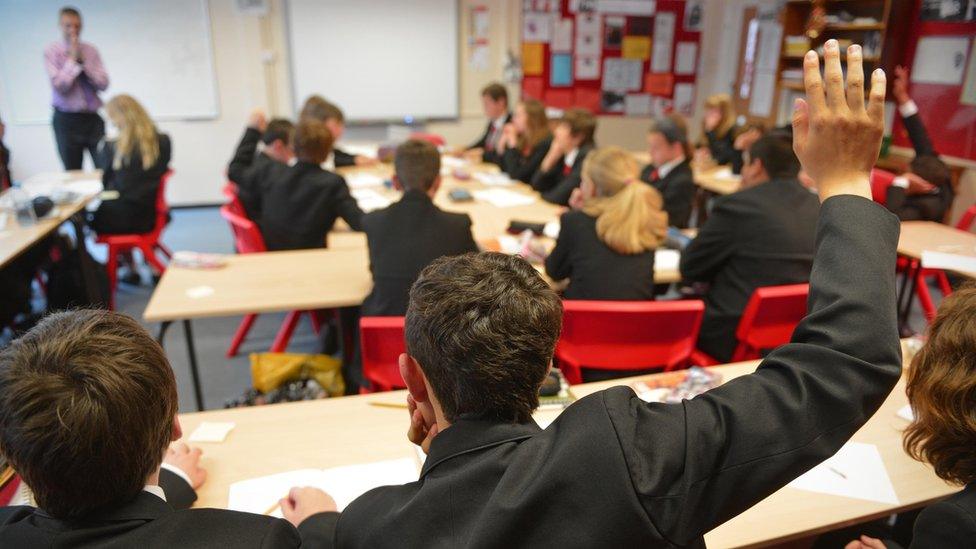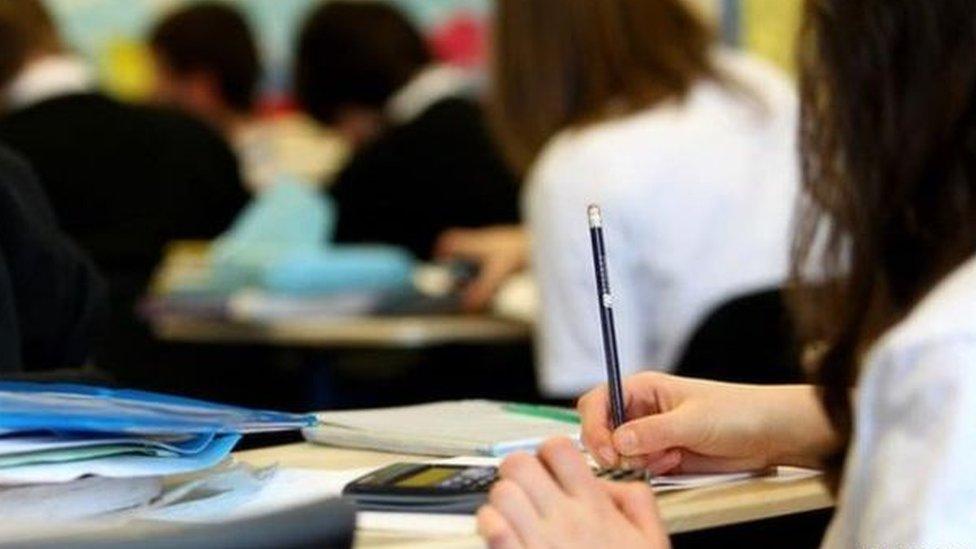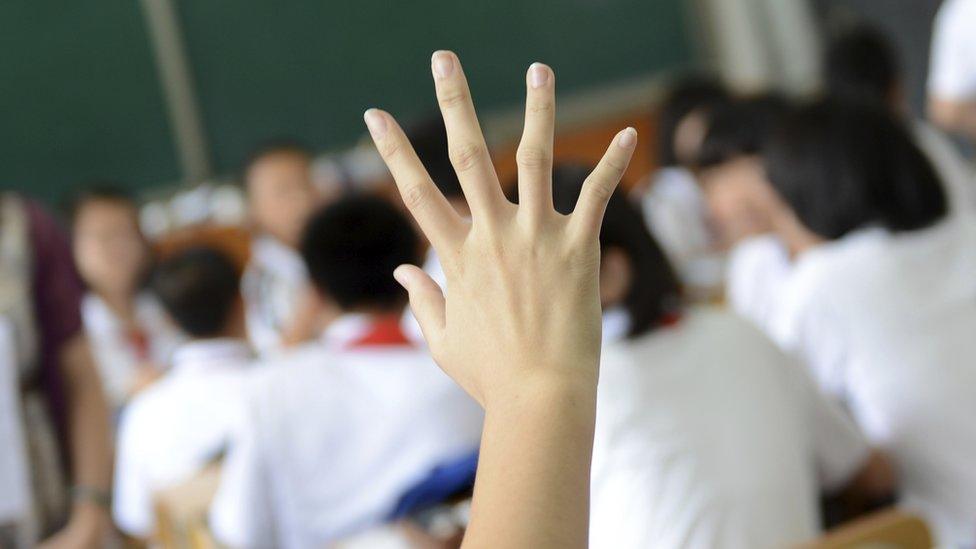Teacher shortage blamed for 'limited' range of subjects in schools
- Published
- comments

Teacher shortages may be limiting the range of subjects available to pupils in schools, according to the Scottish Conservatives.
The party claimed that some schools offer a wider choice of Highers than others nearby.
It said the disparity is often at its widest in the areas where there are also teacher shortages.
The largest teachers' union, the EIS, said the reasons for large disparities required further investigation.
The Scottish government said Curriculum for Excellence "gives schools flexibility to offer different approaches to subject choices to meet the needs of pupils".
Some in local government believe the Conservatives have used the figures unfairly.
The statistics were obtained through Freedom of Information by the Scottish Conservatives.
Subject 'hubs'
The party said that in some local authority areas there is a significant difference between the school offering the greatest number of Higher subjects to pupils and the school offering the least.
For example, the party says that in Edinburgh the school with the most subjects on offer has 21 more choices available than the school with the least. In Highland, where there are a number of secondary schools in relatively remote locations, the gap is 24.
In Glasgow, the party says schools offer between 13 and 27 subjects.
However, many within education would point out that students are not necessarily denied the chance to take a Higher simply because the subject is not available at their school - in some areas, less popular subjects are offered at "hubs" which take in students from a number of schools.

Scottish Conservative education spokeswoman Liz Smith said the SNP must address the issue before more young people are affected.
The Conservatives said there appeared to be a correlation nationally between the areas where students had the fewest choices and the areas with the greatest teacher shortages.
The party's education spokeswoman Liz Smith MSP said: "There will always be some very understandable variation in subject choice across different schools of rural and urban differences, depending on the size of school and different pupil cohorts.
"But parents will be alarmed to see the extent of the variation in some local authorities, particularly between similar types of schools.
"They will be even more concerned when they learn that there is some correlation between lower choice options and those local authorities experiencing higher teacher shortages.
"Subject choice is clearly critical when it comes to SQA qualifications and entry to college, university and the workplace.
Key subjects
"It's therefore a very important part of any pupil's education.
"This has always been a problem, but it's being exacerbated as a result of problems with teacher recruitment.
"John Swinney knows only too well a few schools in his own Perthshire constituency have had real problems with recruiting teachers, including in key subjects like maths.
"That is completely unacceptable. The SNP must address this issue head on before more young people are adversely affected."

Decisions on exactly which subjects to offer are up to individual schools and councils, but in practice certain subjects are on offer virtually everywhere.
If there were to be any examples of a major subject not being readily available - for example English, maths, a science or a popular modern language - it would be hugely controversial.
However, there is a second tier of subjects which will not always be available at particular schools. These might include economics, geology or less popular languages.
Decisions on what subjects to offer are likely to be determined by two factors: how much demand there is from students and whether teachers are able to provide the course.
But there are ways of ensuring students' choices are not restricted to the options at their own school.
For instance, hubs can be created so certain Highers may be on offer at one school or education centre in the area. Pupils who attend other schools would travel there for that particular subject. Inevitably, this is easier in urban areas where schools are a relatively short distance apart.
But isolated schools can extend the range of subjects on offer too.
One of the most isolated secondary schools on the mainland is Mallaig High School - its school handbook stresses that the subjects on offer within the school can be supplemented by a range of open and distance learning courses. It says that in past years, Spanish, psychology and geology have been popular.
The EIS said it was important for youngsters to have access to a diverse curriculum and models would vary across the country.
A spokesman said: "In order to be best prepared for a life after education, Scotland's children and young people need to have access to a wide-ranging and flexible learning experience. Although slight differences should be expected, the size of some of these differences in certain local authorities may require further investigation."
A Scottish government spokesman said: "Curriculum for Excellence gives schools flexibility to offer different approaches to subject choices to meet the needs of pupils, and many schools have arrangements with other schools or colleges allowing young people to study courses that cannot be provided locally.
"To give all our young people the best opportunity of success, we need to have the right number of skilled teachers in our schools. Our deal with local authorities to maintain the pupil-teacher ratio has seen an increase in teacher recruitment by councils and resulted in 253 more teachers last year."
Narrow question
Glasgow City Council insisted the Conservatives' figures did not reveal "a bad thing".
It said: "Glasgow schools operate a cluster system in which neighbouring schools collaborate across a range of issues to ensure the best possible outcomes for pupils.
"Where a subject is unavailable at Higher in a particular school, then it is invariably available in a partner school."
Cosla, which represents the vast bulk of councils, said the Conservatives had asked a very narrow question designed to get a specific response.
A spokesman said: "We all know that statistics can be made to say what you want them to.
"At present, the system and structure enables young people to access courses beyond what any individual school can offer.
"Local authorities have provided such opportunities over a number of years - this is not new to us. We have actively promoted this innovation in the delivery of the education service to maximise the opportunities for our young people.
"Despite severe financial pressures, Scotland's schools still very much try to build the subjects they make available around the choices the pupils make when selecting their subjects for the following year. And whilst this is sensible planning and an excellent model, gaps if there are any can be filled by utilising other nearby schools."